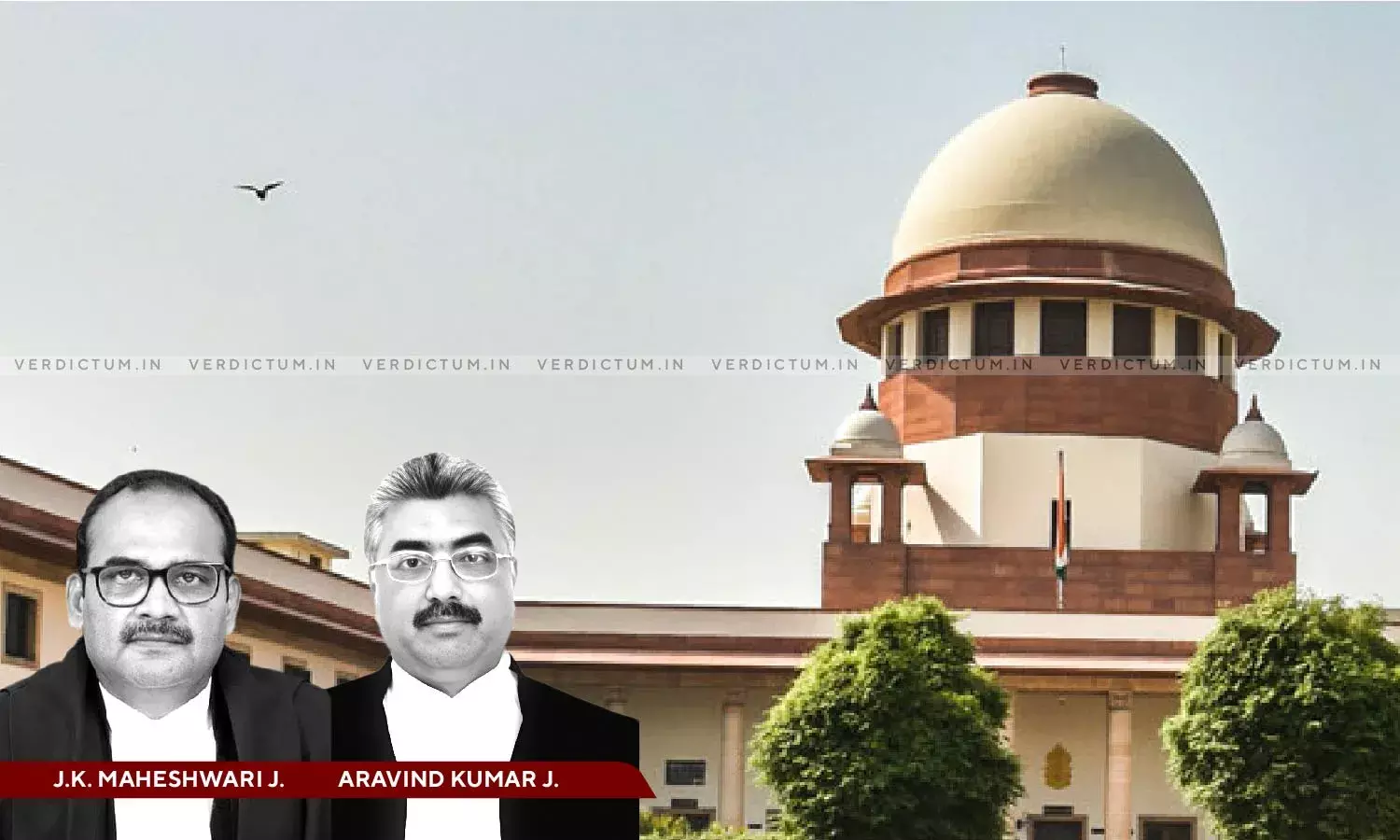Mere Correspondence Stating Non-Issuance Of SCN Not Sufficient To Prove Fraud & Warrant Termination From Service: Supreme Court
The Supreme Court was of the view that mere bald statement that the appointment was based on forged document or on fraud is not sufficient.

Justice J.K. Maheshwari, Justice Aravind Kumar, Supreme Court
The Supreme Court held that a mere correspondence stating non-issuance of the show-cause notice (SCN) is not sufficient to prove an allegation of fraud and warrant termination from service.
The Court held thus in a Civil Appeal filed against the Order of the Patna High Court’s Division Bench which dismissed the Letters Patent Appeal (LPA) in which the termination order was in question.
The two-Judge Bench comprising Justice J.K. Maheshwari and Justice Aravind Kumar observed, “This is a case wherein after appointment the appellant has worked for more than 16 years regularly and was regularly paid salary by the department, which is a fact. As such, he has acquired the status of permanent employee. Thereafter, such issuance of show cause notice by merely referring to one LPA and the correspondence of the department regarding non-issuance of appointment order is improper. Because, a mere correspondence stating non-issuance is not sufficient to prove an allegation of fraud and warrant termination from service.”
The Bench was of the view that mere bald statement that the appointment was based on forged document or on fraud is not sufficient.
AOR Anil Kumar Mishra represented the Appellant while AOR Manish Kumar represented the Respondents.
Brief Facts
In furtherance to an advertisement, the Appellant was appointed as a Clerk in 1989 and was posted at a High School in Bihar. He submitted his joining which was initially resisted by headmaster but later he was allowed to join and he performed his duty. Thereafter, on transfer to other schools, he worked for more than one and a half decade. In 2005, the District Education Officer, Patna issued a show cause notice, alleging that his appointment was forged and accordingly, his services were terminated allegedly without following the due process of law.
Appeal filed against such termination was also rejected. Being dissatisfied, he filed a Writ Petition, which also got dismissed. Subsequently, the Appellant filed the LPA before the Division Bench, which was also dismissed and the Single Judge’s Order was maintained. Being aggrieved, the Appellant was before the Apex Court.
Reasoning
The Supreme Court in view of the above facts, said, “In the cases where mere allegation of fraud has been made without any foundation, and then the records have been called by the Court to assess such allegations, it is the earnest duty of the Head of the Department to produce the same for perusal. Otherwise in the facts, it was incumbent upon him to conduct an internal enquiry and to find out whether the process of selection was carried out or not. It was also the duty of the Head of the Department to place such record before the court.”
The Court added that if the said record was not traceable, then it is the duty of the Department to identify who is responsible for misplacing such record, and an enquiry in this regard ought to have been conducted against the defaulting person and report in that regard should have been placed.
“In absence thereof, mere plea of non-traceability of the record is insufficient. Thus, despite granting multiple opportunities, which resulted in non-production of the record, in the above facts, we are constrained to draw adverse inference against the respondents”, it noted.
The Court further observed that in absence of any foundation of fraud in the pleading or in the counter affidavit, it is not inclined to accept such plea of fraud.
“Moreover, the reason of termination as mentioned in the order impugned is also contrary to the documents placed on record. … In case after such a long time of service, if the department was of the opinion that the order of appointment is not available on record, an enquiry should have been conducted for looking into the alleged forgery in issuance of the appointment order. In absence of any such enquiry, such allegations of fraud and fabrication leading to termination are unjustified”, also said the Court.
Conclusion
The Court remarked that the order of termination is based on a reasoning which is per se untenable on fact and record and the allegation of fraud has not been pleaded and substantiated.
“In absence of holding any enquiry of such allegation, the order of termination is liable to be quashed. The findings recorded by the learned Single Judge and the Division Bench are also without due consideration of the above facts and are not based on sound reasoning, hence, liable to be set aside”, it concluded.
Accordingly, the Apex Court allowed the Appeal, set aside the High Court’s Order, quashed the termination order, and directed that the Appellant shall be reinstated in service with back wages to the extent of 50% from the date of termination till his reinstatement.
Cause Title- Naresh Kumar Sinha v. State of Bihar & Ors. (Neutral Citation: 2025 INSC 814)
Appearance:
Appellant: AOR Anil Kumar Mishra and Advocate Anurag Singh.
Respondents: AOR Manish Kumar


